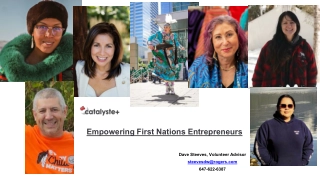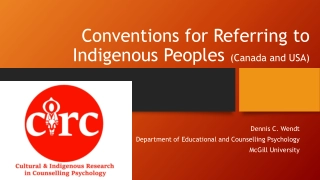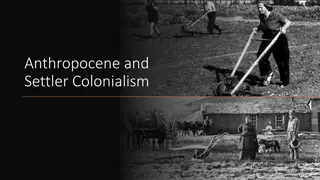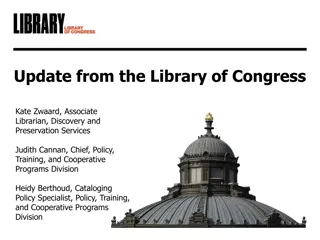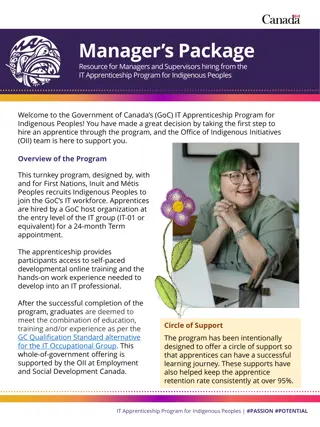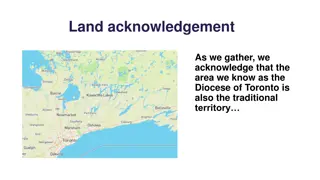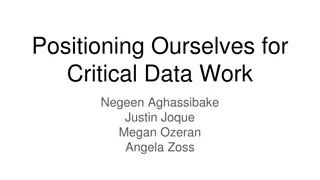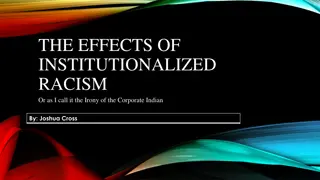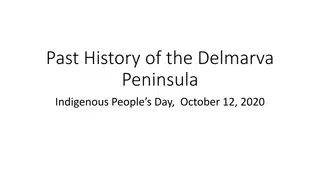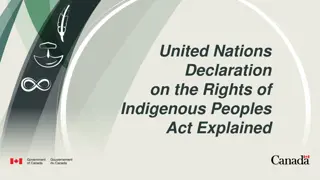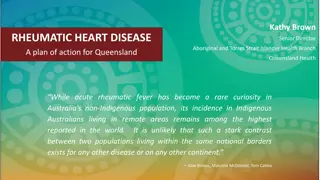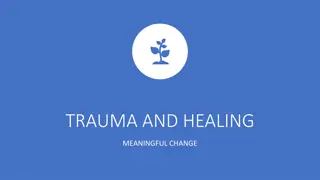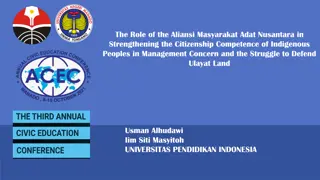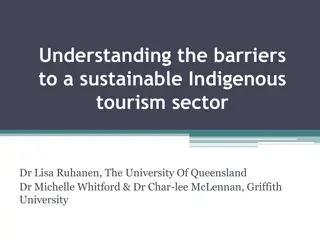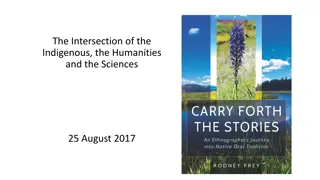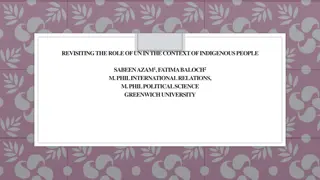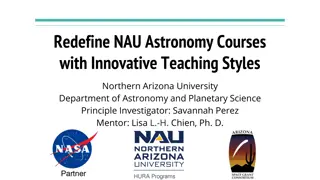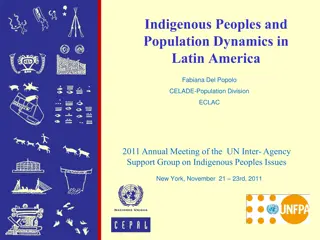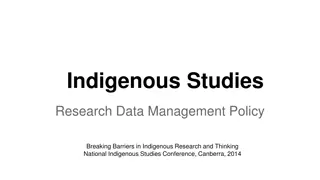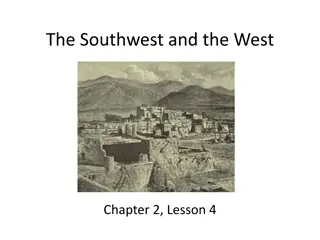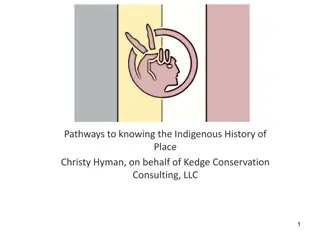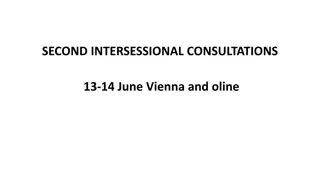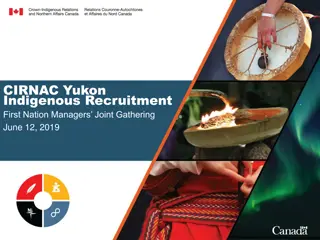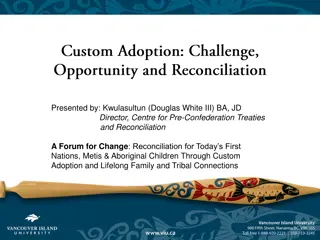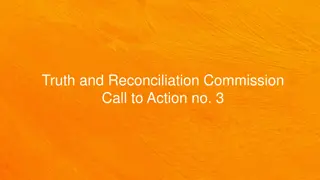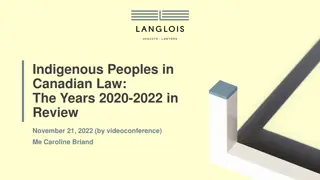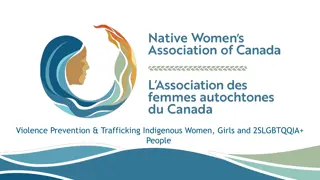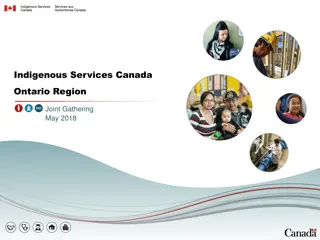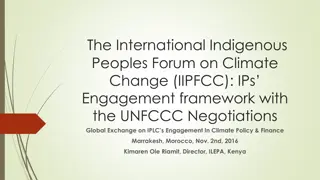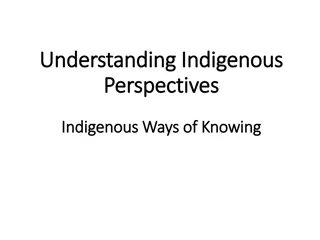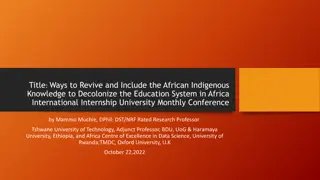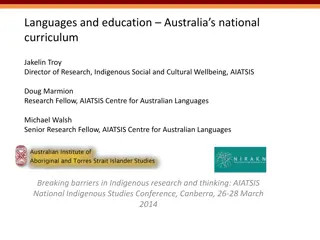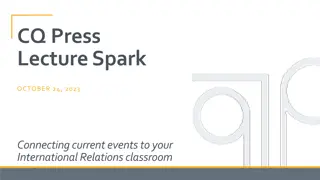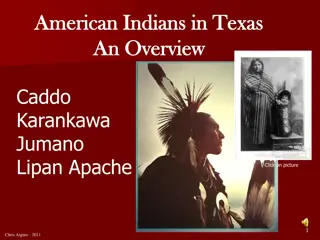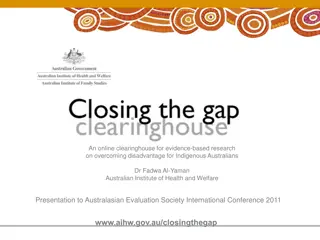Empowering First Nations Entrepreneurs
Empowering First Nations Entrepreneurs is a program by OFNEDA, a Canadian economic development organization, providing guidance and support to Indigenous entrepreneurs. The initiative matches Indigenous partners with experienced volunteer advisors to enhance capacity-building and facilitate communit
0 views • 28 slides
Conventions for Referring to Indigenous Peoples in Canada and the USA
This article outlines guidelines for referring to Indigenous Peoples, emphasizing specificity and respect for preferred names and terms. It discusses the importance of capitalizing terms related to Indigenous Nations and cautions against using terms implying colonial possession. The use of terms lik
1 views • 24 slides
Settler Colonialism and Its Impact in the Anthropocene
Settler colonialism, a structure of domination, aims to permanently transfer settlers to Indigenous lands, leading to ongoing dispossession and conflict. This form of colonialism disrupts Indigenous nationhoods, political practices, and sovereignties. The dispossession of Indigenous bodies and lands
1 views • 8 slides
Update from the Library of Congress on Indigenous Peoples' Land Acknowledgment and Terminology Challenges
The Library of Congress recognizes the importance of acknowledging Native American land and is committed to rectifying incorrect and offensive subject headings for Indigenous peoples. Challenges in terminology and necessary changes are addressed to show respect for Native cultures.
1 views • 18 slides
Indigenous IT Apprenticeship Program Overview
The Government of Canada's IT Apprenticeship Program for Indigenous Peoples offers a comprehensive 24-month term appointment to develop Indigenous individuals into IT professionals. Supported by the Office of Indigenous Initiatives, the program provides hands-on work experience and online training,
0 views • 6 slides
Acknowledgement of Indigenous Territories in the Diocese of Toronto
The Diocese of Toronto acknowledges the traditional territories of the Anishnaabe, Haudenosaunee, and Wendat peoples, along with the Dish with One Spoon Wampum Belt Covenant. They express gratitude for Indigenous stewardship of the land, recognize historical injustices, and commit to fostering an ho
1 views • 8 slides
Positionality and Indigenous Data Sovereignty in Critical Data Work
Explore the impact of positionality on data work, challenge notions of value-free research, and address issues of erasure and harm in Indigenous data sovereignty. Reflect on how personal values and experiences influence data understanding, and consider the rights of Indigenous peoples in owning and
5 views • 8 slides
Unveiling the Effects of Institutionalized Racism on Indigenous Peoples
Delve into the intricate web of institutionalized racism faced by Indigenous communities, exploring key concepts like covert racism versus operant racism, decolonization, and settler benefits. Learn how historical injustices, such as the Indian Act, continue to impact Indigenous autonomy and the fig
10 views • 21 slides
Indigenous Communities in Disaster Recovery
Increased understanding of intrinsic strengths and unique impacts of disasters on Indigenous communities, role of Indigenous community-controlled organizations, importance of connection to Country, and need for engagement with Indigenous communities by emergency management agencies. Disasters have u
0 views • 21 slides
Uncovering the Past: Indigenous History of the Delmarva Peninsula
Delve into the rich indigenous history of the Delmarva Peninsula, acknowledging the injustices and hardships faced by Native American communities. From Columbus' invasion to the Trail of Tears, explore the impact of colonization on indigenous peoples and the ongoing efforts to address historical mis
0 views • 15 slides
United Nations Declaration on the Rights of Indigenous Peoples Act
The United Nations Declaration on the Rights of Indigenous Peoples Act, effective from June 21, 2021, aims to protect and promote Indigenous rights, including self-determination and equality. Key elements include the preamble emphasizing reconciliation, interpretive elements in Section 2, and the de
2 views • 13 slides
Addressing Rheumatic Heart Disease Disparities in Indigenous Australians
Rheumatic heart disease (RHD) continues to disproportionately affect Indigenous Australians, particularly those living in remote areas, with a high incidence compared to the non-Indigenous population. Acute Rheumatic Fever (ARF) is a key precursor to RHD, often linked to social determinants and poor
0 views • 7 slides
Exploring Trauma, Healing, and Indigenous Perspectives
Within this content, we delve into the profound themes of trauma, healing, and meaningful change from the perspective of Indigenous peoples. Through acknowledging elders, discussing core principles such as courage and compassion, and reflecting on the impacts of colonial oppression, a narrative of s
2 views • 33 slides
Relationship Between Health and Deaths in Custody in Australia
In Australia, the relationship between prisoner health and deaths in custody is a critical issue. Indigenous inmates are disproportionately affected, with higher death rates compared to non-Indigenous inmates. Addressing prisoner health may offer a potential solution to reducing custodial deaths. Th
1 views • 32 slides
Progress of UN-REDD Programme in Asia: Indigenous Peoples Participation
The UN-REDD Programme in Asia has made strides in engaging Indigenous Peoples in various missions and consultations since 2008. The formulation process includes scoping, programming, validation, and approval stages, with key milestones reached in countries like Papua New Guinea, Indonesia, and Vietn
4 views • 6 slides
Strengthening Indigenous Peoples' Citizenship Competence Through Aliansi Masyarakat Adat Nusantara
In the context of defending Ulayat land, the role of Aliansi Masyarakat Adat Nusantara (AMAN) is crucial in empowering Indonesian indigenous peoples with citizenship competence. This research explores the efforts of AMAN in enhancing indigenous community awareness, understanding, and education to st
6 views • 8 slides
Barriers to Sustainable Indigenous Tourism Sector
Globally, tourism is seen as an opportunity for Indigenous communities. However, barriers such as economic challenges, declining demand, and competition pose significant obstacles. Research conducted in Australia aims to analyze the gap between supply and demand in Indigenous tourism and explore the
0 views • 15 slides
The Intersection of Indigenous, Humanities, and Sciences
The narrative delves into the rich tapestry where Indigenous traditions, Humanities, and Sciences meet, highlighting the contrast in approaches like logical reasoning in Sciences, spiritual origins in Indigenous knowledge, and interpretive wisdom in Humanities. It emphasizes the holistic, narrative-
1 views • 9 slides
Settler Colonialism and Carcerality: Disrupting Indigenous Relationships and Territories
This study delves into the impact of settler colonialism on Indigenous peoples, focusing on the immobilization and movement imposed on them through carceral spaces. It explores the intersections of official and unofficial carceral spaces, shedding light on the disrupting effects on Indigenous relati
1 views • 8 slides
The Role of UN in Indigenous Peoples: A Critical Analysis
The research delves into the role of the United Nations in addressing the unique social, cultural, economic, and political qualities of indigenous peoples worldwide. It discusses the importance of recognizing indigenous rights, traditions, and the challenges they face in contemporary societies, emph
1 views • 7 slides
Innovating Astronomy Education at NAU Through Indigenous Perspectives
Explore how Northern Arizona University is reshaping astronomy education using innovative teaching styles with a focus on Indigenous Astronomy. Gain insights into effective teaching methods, the importance of Indigenous Astronomy lab content, teaching approaches, and creating engaging lab materials.
0 views • 7 slides
Indigenous Peoples and Population Dynamics in Latin America
Latin America is a region with diverse indigenous groups, facing demands for recognition and rights. The importance of information, especially from censuses, is crucial for developing policies and programs to support indigenous peoples. Various data sources such as censuses, surveys, and registries
0 views • 19 slides
Indigenous Studies Research Data Management Policy: Breaking Barriers in Indigenous Research
Covering cultural rights, Indigenous data custodianship, policy developments, and ATSILIRN protocols, this presentation at the National Indigenous Studies Conference in 2014 highlights key issues and approaches in managing research data in Indigenous studies.
0 views • 61 slides
Indigenous Peoples of the Southwest and West: Adapting to Environment and Trade Networks
Indigenous peoples of the Southwest and West, such as the Pueblo, Navajo, Shoshone, Nez Perce, and Chumash, adapted to their environments by building adobe homes, utilizing trade networks for resources, and honoring their beliefs through ceremonial practices. They thrived by growing staple foods, hu
0 views • 6 slides
The Impacts of Colonialism on Indigenous Communities
The article delves into how East Coast Indigenous communities were profoundly affected during the colonial period and beyond, enduring forced removals, enslavement, attempted genocide, and subjugated statuses. It explores the historical realities that continue to shape the presence and representatio
1 views • 18 slides
Role of Civil Society and Indigenous Peoples in Countering Cybercrime
Civil society and indigenous peoples play a crucial role in the implementation of the International Convention on Countering the Use of Information and Communications Technologies for Criminal Purposes at national levels. Cybercrime encompasses various activities, ranging from fraud and identity the
0 views • 15 slides
Indigenous Recruitment Action Plan Overview
CIRNAC Yukon developed an Indigenous Recruitment Action Plan focusing on three themes: Outreach, Renewing the job advertisement, and Mentorship. The plan includes various activities such as attending job fairs, partnering with colleges, and creating employee profiles to attract local Indigenous cand
0 views • 12 slides
Addressing Intergenerational Crisis Through Custom Adoption and Legal Recognition
The presentation emphasizes the importance of recognizing ancestral laws and customs of Aboriginal peoples in addressing the intergenerational crisis faced by First Nations, Métis, and Aboriginal children. It explores the history of custom adoption, Indigenous traditions, and legal provisions. Focu
0 views • 28 slides
Call to Implement Jordan's Principle for Indigenous Children
The Truth and Reconciliation Commission's Call to Action No. 3 emphasizes the need for all levels of government to fully implement Jordan's Principle, which prioritizes the needs and well-being of Indigenous children. Highlighting the story of Jordan River Anderson, the call underscores the importan
1 views • 19 slides
Indigenous Rights Litigation in Canadian Law: A Review of 2020-2022
Strategic considerations in Indigenous rights litigation, social acceptability in decision-making, Indigenous identities, and future expectations were discussed in a review from November 21, 2022. The case of Southwind v. Canada highlighted issues of fiduciary obligations and equitable compensation
1 views • 50 slides
Indigenous Environmental Justice & Biodiversity Interconnection
Exploring the intricate relationship between Indigenous environmental justice, biodiversity, and cultural diversity as discussed by Jenell Navarro, Ph.D., and Winona LaDuke. The impact of settler colonialism, capitalism, and loss of Indigenous populations on environmental degradation is highlighted.
0 views • 9 slides
Violence Prevention and Trafficking in Indigenous Communities
Explore key terms like assimilation, colonialism, discrimination, grooming, and human trafficking in the context of Indigenous women, girls, and 2SLGBTQQIA+ people. Learn about concepts such as intergenerational trauma, patriarchy, racism, and settler colonialism that impact these communities. Under
1 views • 32 slides
Indigenous Services Canada Achievements and Initiatives Overview
Indigenous Services Canada in Ontario region held a joint gathering in May 2018, leading to the formation of a new department focusing on improving health outcomes for Indigenous communities. The department has made significant strides in enhancing services such as healthy child development, mental
0 views • 25 slides
International Indigenous Peoples Forum on Climate Change (IIPFCC) Engagement Framework
The IIPFCC is a platform where indigenous peoples globally come together during UNFCCC negotiations to voice their concerns and shape outcomes. The forum provides a safe space for consensus-building on shared issues. Co-chaired by representatives from different regional groupings, the IIPFCC operate
0 views • 14 slides
Indigenous Knowledge in Education
Delve into Indigenous ways of knowing, understanding, and learning, emphasizing the importance of integrating traditional Indigenous pedagogies in education. Learn about the characteristics, sources, and values of Indigenous knowledge, and explore the intersection of Indigenous knowledge with Wester
0 views • 46 slides
Reviving African Indigenous Knowledge for Decolonizing Education
Mammo Muchie, a distinguished DPhil and research professor, will address the urgent need to revive African Indigenous Knowledge within the education system to decolonize it effectively. The conference will explore the key characteristics of Indigenous Knowledge, highlight the exemplary model of Imho
0 views • 84 slides
Preserving Australian Indigenous Languages in Education
The development of the Framework for Aboriginal Languages and Torres Strait Islander Languages in the Australian Curriculum aims to give equal representation to Australian languages alongside other world languages in schools. This initiative helps preserve, document, and maintain indigenous language
0 views • 28 slides
Australians Reject Indigenous Advisory Panel: Impact & Challenges
Australians recently voted against establishing an Indigenous advisory panel, highlighting inequities faced by Indigenous Australians. The referendum faced misinformation and lacked clarity on its benefits. The rejection raises questions on addressing Indigenous issues, impacting Australia's global
1 views • 5 slides
Indigenous Peoples of Texas: Caddo and Karankawa Tribes Overview
Explore the rich history of the Caddo and Karankawa tribes in Texas. Learn about their way of life, including housing, food sources, and hunting practices. Discover how these indigenous peoples shaped the region.
0 views • 17 slides
Enhancing Indigenous Wellbeing: Evidence-Based Research Clearinghouse
An online clearinghouse, led by Dr. Fadwa Al-Yaman at the Australian Institute of Health and Welfare, aims to identify effective programs for Indigenous Australians. It focuses on key areas like life expectancy, education, and employment outcomes, providing resources and publications to inform polic
0 views • 28 slides
